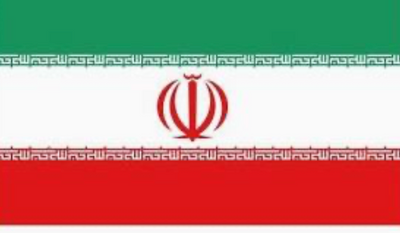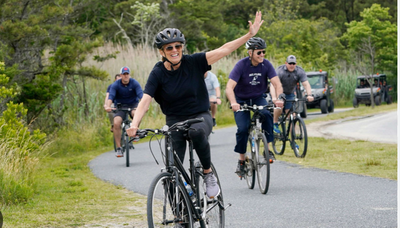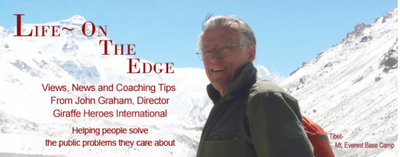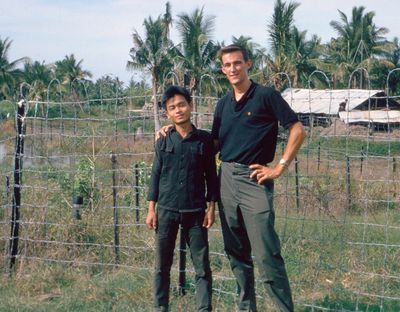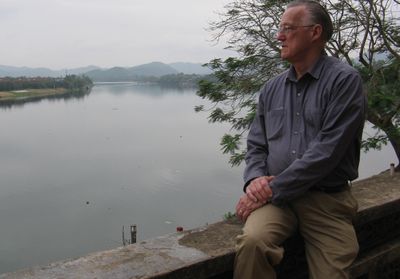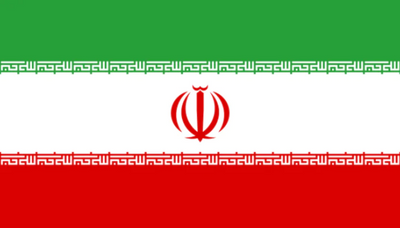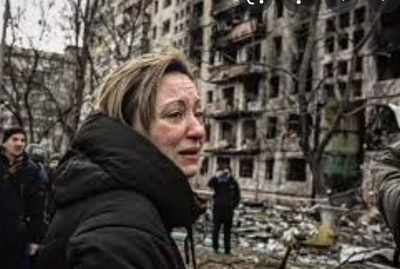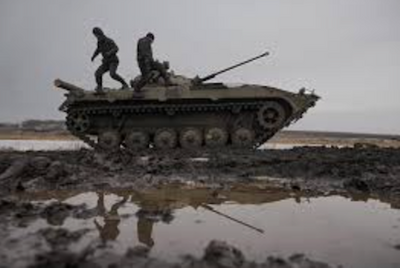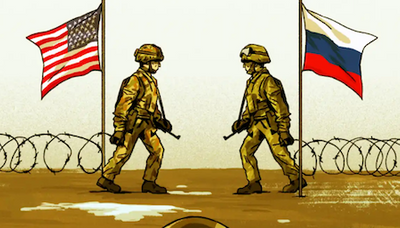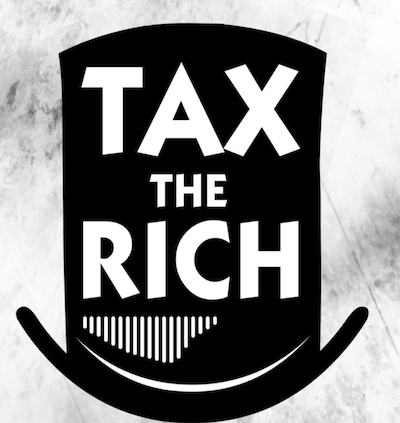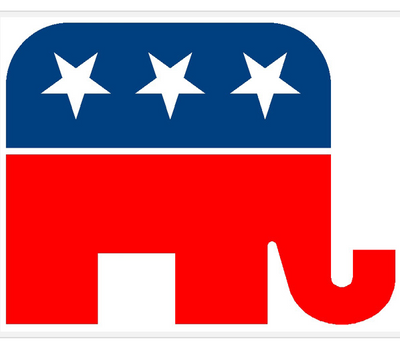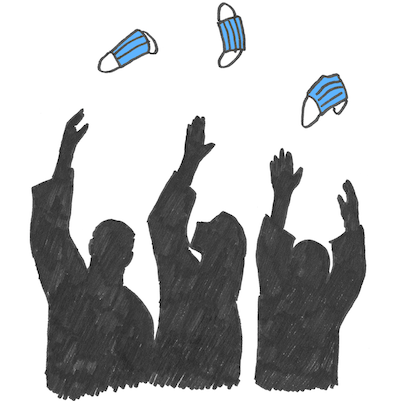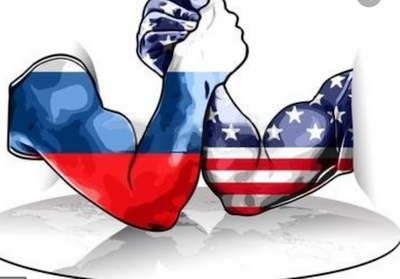Blog
A place to help create public policy and personal action that is visionary, effective, courageous, and compassionate

Welcome to a place for exploring insights and solutions to the public problems that test our times. This space is where I hope there will be discussion, co-learning, collaboration and—I hope—organizing actions. Your comments are welcome after each piece. Some of my own views come from fifteen years in the US Foreign Service, most of them spent way off the beaten track. Some come from my career since then as an activist, coach and mentor to activists, and President of Giraffe Heroes International, moving people to stick their necks out for the common good.
"Thank you John. I have deep respect for you, your work and your valuable insights. Few people are able to be as forthright and as honest as you. In the past, I have heard only hints of what you have shared."— Paul Morris
Sign Up for My Blog
If you haven't already, I invite you to to sign up to regularly receive my blog pieces, I regularly post some hopefully competent, provocative words on hot button issues to which I invite you to respond.. Privacy rules: I protect your data and will never sell or lend subscribers’ addresses to anyone. Ever.
You can also check out my blog archives, below.
Read the blogs here
Iran: A Haunted Renaissance
John Graham
I’m betting you’re overwhelmed by the torrent of news coming at you, so much of it awful. I know the feeling, but I still want to talk to you about the closed-to-the-world nation of Iran and its place in the global rising tide of autocracy. An Iranian contact of mine has been sending me his observations, an extremely smart, well-educated and reflective man who’s given me permission to share his unedited words with you.
I see in them a fearful comparison between the loss of freedoms and the isolationism of today's Iran and the world Donald Trump and his MAGA acolytes would take us to if we let them. Soon I’ll send you what my contact has written about the US, in hopes his analyses help us learn from the Iranian resistance.
------------------------------
Iran: The Haunted Renaissance
It’s the Time: A Global Reckoning of Identity, Trauma, and the Human Spirit
“History does not repeat itself. But it does rhyme.”
In the spring of 2025, the rhyme is deafening.
From the resilient echoes in Tehran’s digital underground to the haunted landscapes of Gaza and Israel, from the fractured identity politics of the United States to the quiet, internal shifts across the Arab world, our era is defined by more than conflict. We are witnessing a profound global identity crisis, interwoven with unprocessed historical trauma, the performance of ego, and a deep, often unacknowledged, hunger for authentic belonging and meaning.
moreBecoming a Citizen Peacebuilder
John Graham
Rajmohan Gandhi, the grandson of India's founding father, honored me by asking me to write for his new magazine, We are One Humanity. The purpose of his initiative —indeed the purpose of this man's whole life—is to invite everyone to explore ways of preserving or restoring goodwill, human rights and democratic ideals in our world.
I'm reposting my article here:
BECOMING A CITIZEN PEACEBUILDER
I'm honored that Rajmohan Gandhi has invited me to submit some thoughts for his ambitious and much needed new publication. I’ve known Raj for many years, and I’ve always been amazed by and grateful for his clear thinking, passion and honesty.
And especially his courage—a quality of character that seems so absent these days, an absence that, in my view, is a primary driver behind the ignorance, injustice, and violence that today are tearing our world apart. It is writ large in places like Gaza but is often toxic in the communities we, in other parts of the world, call home.
If I have learned one seminal truth in the 82 years I’ve been on the planet, it’s this: we each shape our outer worlds by the way we live our inner ones. Wars, race riots, lethal inequalities, social media venom—none of this descends on us from some dark cloud over which we have no control. No, these disasters are the inevitable expressions of personal demons too many people lack the courage to confront.
moreIt’s Time to Take away Biden’s Car Keys
John Graham
Have you ever had to take away an aging parent’s car keys? I have.
I remember how hard it was when my family, seeing that my dad’s declining mental and physical abilities made him a danger on the road to himself and others, took away his car keys. It wasn’t pretty— the family had underestimated how important driving a car was to Dad’s sense of self as vigorous and competent.
Now the Democratic Party needs to take away Joe Biden’s car keys and the risks of inaction are a lot higher than somebody getting hurt by a disoriented driver.
Biden’s recent days of trying to explain away his debate performance has not moved the needle in his direction. None of his post-debate presentations have been nearly good enough to relieve the doubts created by those disastrous 90 minutes watched by 50 million people.
The core problem I see—being almost exactly his age—is that Joe Biden refuses to accept the seriousness of his own decline, a reality that we saw with our own eyes, which will not be wiped away (see my commentary on the debate).
The most chilling statement from Biden’s ABC interview last Friday came in his answer to a question about how he would feel next January if Trump won the election. He said that what was important would be knowing that he had given it his all and had done his best—
morePlease Joe (and Jill) Get Real
John Graham
By now you’ve read opinions and analyses of Joe Biden’s debate performance. I add my views from the perspective of being almost exactly Biden’s age and having been a competent platform speaker for half a century.
Of this there’s no doubt: Biden tanked. He looked and sounded frail and uncertain. Where he should have countered Trump’s blasts of lies and invective with a clever mix of humor, anger and facts, he mumbled statistics. There was an appalling lack of energy and conviction in his voice. The debate was not a debate; it was a Sound and Light show in which style, posture, and tone were far more important than facts, and Biden either did not understand that or could not cope with it.
We’re now told that he had a bad cold. What BS! We’ve all had to play hurt from time to time. In perhaps the most important presentation of his life, Biden should’ve popped an Advil, sucked it up, and soldiered on. Laryngitis? Well, the next day he sounded just fine.
Poor debate prep? He and his staff had weeks to prepare. They knew Trump would direct a firehose of lies and insults at Biden with the hope of throwing him on the defensive and undermining his responses. As expected, Trump’s lies were so obvious that most of them should’ve been home run balls that Biden could knock out of the park with a mix of facts and nasty jabs, wrapped in Biden’s inimitable humor.
moreOld Man Biden is the Right Choice Now
John Graham
I’m exactly Joe Biden’s age so I can see myself in his shoes better than most. Actually, I almost went into politics myself when some pols here in Washington State suggested I run for Congress decades ago. That ship has long sailed but I’ve done demanding work in the US Foreign Service and continue to put in challenging work days in the nonprofit world and as a global peace-builder.
Now, like Biden, what I may have lost in stamina I’ve more than made up for with acquired wisdom, experience, stability and significantly better skills in communication and team work.
Like Biden, I’m slowing down physically. I can’t climb mountains anymore and my marathon medals just remind me how much fun it was to run for miles. The last time I ran was between gates in an airport, I wince getting up from a low sofa, and I needed a wide bike lane to feel safe riding the racing bike I just gave away.
In the interest of keeping what still works working, I work out every morning and walk 15 miles a week (and if I stumble on rough pavement, it has nothing to do with age!) Biden works out, bikes, and has a personal trainer to help keep him fit. Matched against the obese, sedentary Trump, who do you think is most likely not to finish a second term?
moreExploring the Risks That Matter
John Graham
Let’s face it, I told the Explorers Club in a speech November 11 in Seattle, there’s not a lot of unexplored real estate left on this planet. Other planets beckon, but perhaps not for everyone in this room.
And that’s OK, because after a lifetime of adventures and risk, I’m convinced that the most meaningful explorations any of us can take are not in pushing the limits of the map but pushing the limits of ourselves—challenging not just our courage but our compassion, seeking not to find a new world but to find solutions to the pressing problems in the world we already have. Finding, not a pot of gold, but a meaningful life anchored in service.
I didn’t see this truth for a long time.
I went to sea on a freighter the summer I turned seventeen. This was, mind you, way before container ships; cargo vessels then had crews of 50 or 60 really tough guys, all of whom were determined to teach me lessons they knew I would never get in school. I leave the detailed stories for another day except to say that the first port of call in Southeast Asia ended with a pitched brawl with local dock workers and a hangover that lasted three days.
I changed, and it was by more than a barroom brawl. I was not in mid-50s Tacoma any more. Roaming the Far East as a 17-year-old opened me to a huge vision of a wider world, pulsing with energy, colors and excitement. I wanted to explore it more—a lot more.
moreIf There's a Hell, Henry Kissinger is in It
John Gaham
There’s no doubt that Henry Kissinger was a complicated man, as shown by the torrent of fierce opinions published since his death.
I worked for the man and Vietnam was where I first began to hate him. A young US diplomat, I was a civilian adviser to the Mayor of Hué, one of the most dangerous places in the country during the last years of the war, at a time when any American there still in control of his senses knew we’d lost the war.
Kissinger and Nixon knew this too, and had begun to rapidly withdraw US troops soon after I arrived there in January, 1971. But the two men also knew they could not admit defeat. Both were concerned about America’s image—Nixon mindful of his own political fortunes and Kissinger more concerned that America’s global rivals would see a US defeat in Vietnam as proof of America’s weakness.
So the two launched a strategy called “Vietnamization” to promote the fiction that the South Vietnam could win the war without American boots on the ground. It was never more than a PR ploy to divert attention from the fact that the US has just gotten its butt kicked by a small, poor nation few Americans had even heard of when we began fighting there.
moreA Personal Battle in Vietnam
John Graham
As you may know, Gordon Lightfoot recently died. You may have memories of the Canadian singer/songwriter’s work. My memory is that he changed my life.
In 1971-72, as a US Foreign Service Officer, I was Advisor to the city of Hué, South Vietnam. I’d volunteered for Vietnam because being in a shooting war was one adventure I’d not yet had.
I was an adrenaline addict, drawn to war zones and high, dangerous mountains. I’d asked the State Department for the most dangerous job they had in Vietnam and they had definitely obliged. Hué, the site of the infamous Tet Offensive of 1968, was just south of the Demilitarized Zone between the two Vietnams and a constant target for North Vietnamese troops and Viet Cong guerillas. Some of my work involved dealing with Viet Cong undercover agents in the city. I was an easy target for snipers and car bombs. At first I loved it—the hair rising on the back of my neck, the shadows in the night… It was all fuel for a self-absorbed and shallow life.
But my most significant battle in Vietnam was an inner one. The war became more than just the source of the next biggest thrill—a killing field where my actions endangered more lives than my own, in a war which I soon came to regard as stupid and unwinnable. I was in Vietnam as a mercenary, paid in adrenaline instead of gold.
moreA Near-Miss That Almost Changed History
John Graham
The Iran Hostage Crisis Re-visited
In November of 1979 the staff of the US Embassy in Teheran was taken prisoner by mobs controlled by the Ayatollah Khomeini. Two months of diplomatic pressures and direct threats hadn’t freed them.
But in early 1980, I came close.
I thought I knew then why I’d failed, but I didn’t know the half of it. Decades of investigative reports have now revealed the truth. Any efforts to free those hostages before the U.S. Presidential election that next November would have been undermined by powerful operatives in Ronald Reagan’s election campaign who saw that keeping the hostage crisis on the front burner would be a fatal blow to the chances of Jimmy Carter winning a second term.
I was at the time an American diplomat at the US Mission to the United Nations in New York. I’d been ordered not to talk to members of the Cuban delegation, our sworn enemies since Castro’s Communist takeover there. I thought that was stupid, so I talked often with the Castro Cubans, usually in bars well off the UN campus. They were baseball nuts as was I, so baseball became a vehicle for establishing respect and friendships with these people on the US hate list. It also led to an exchange that could have freed the American hostages in Tehran a year before they were finally released. Here's the section of my memoir, Quest, that gives you that story:
moreTo Leak or Not to Leak?
John Graham
The recent security breach by a young idiot video-gamer out to impress his friends was worse than you think. It could end up being one of the worst security breaches in the history of US intelligence operations.
It should never have happened. It’s crazy that anybody in the US government would consider giving a top-secret clearance to a naïve, unqualified kid in the National Guard. The real damage has yet to be fully known, but it’s already clear that US intelligence services are the laughingstock of their counterparts around the planet, friend and foe. As well they should be.
In the 70s, in the middle of the Cold War, as a US Foreign Service Officer, I was a member of NATO’s top secret Nuclear Planning Group (NPG), charged with planning how a nuclear war might be waged—and “won”—in Europe. It was a very prestigious job and a steppingstone to higher rank. I was given a Top-Secret Umbra clearance—plus a clearance above that that allowed me to spend a week at a secret facility in New Mexico learning about specific nuclear weapon designs. The idea was to learn how to target the right weapon to the right target (maximize blast in order to knock down buildings; maximize radiation to kill people).
moreUkraine—Even Now, a Possible Path to Peace
Yes, I’m writing here about peace. But let’s be clear: The recent atrocities committed by retreating Russians north of Kiev—added to their relentless bombing and shelling of civilian targets all over Ukraine—have made any peace-building initiatives much more difficult. Still, this evil madness will end someday, and those with the will and skill to build a peace must be ready. .As an experienced international negotiator, I have some ideas.
You wouldn’t know it from the media, but this war in Ukraine is far more complex than just a Russian attempt to crush an obstreperous neighbor whose independent actions threaten a resurgent Russian empire.
A good part of what’s driving the fighting is long simmering civil strife between Ukrainian-speaking citizens in the western part of that country who favor closer ties with Western Europe, and Russian-speaking Ukrainians living in the far eastern part of the country (Donbas), who have close economic and cultural ties to Russia.
I was involved in efforts to resolve that strife eight years ago. As Director of Giraffe Heroes International, I’ve gotten involved in tough peace-building efforts when it seemed my experience and expertise as a former US diplomat could make a difference. In July, 2014 that work led me to a five-day conference held in a magnificent old hotel perched on a mountaintop in Switzerland above Lake Geneva. I was there, not to mediate, but to support, encourage and facilitate the dialogues.
moreCould Putin’s Invasion Go Nuclear? A Former NATO War Planner Assesses the Odds
Will a nuclear war start in Ukraine? Is that even possible? Maybe we’re just watching a Netflix re-run of Dr. Strangelove.
No. It’s possible. As someone who once planned nuclear war for NATO, I can tell you that events in Ukraine have moved us closer to Armageddon than anything since the Cuban Missile Crisis.
Putin said two weeks ago that he’d placed Russian nuclear forces in “a high state of readiness,” but NATO intelligence has picked up no sign as yet of the actual movement of warheads and launch vehicles out of locations where they are stored. That’s a good thing.
But the possibility of nuclear war is still what motivates NATO’s refusal to create a “no-fly zone” over Ukraine, a move that would carry the risk of widening the war beyond Ukraine, up to and including a nuclear response from an irrational and unpredictable Russian leader.
Here’s how I’d assess the current odds on a nuclear war starting in Ukraine:
First, the stakes in this war get higher with every public comment made by the leaders of NATO, Russia and Ukraine, ratcheting up tensions and providing incentives for increasingly risky behavior.
Putin has made it plain he sees the war in Ukraine as an existential crisis where a Russian defeat would threaten the very existence of the Russian state. He sees Ukraine as an integral part of Russia, intertwined by over 1,000 years of history, ethnicity, geography, and culture. Putin has fumed for two decades over NATO’s eastward expansion following the collapse of the Soviet Union. Now he sees expansion of NATO into Ukraine as a dagger pointed at Russia’s heart.
morePutin Has Already Lost This War
“There are decades where nothing happens; and there are weeks where decades happen”–Vladimir Lenin
I was wrong. A month ago I predicted that Putin’s massing of Russian troops on the border of Ukraine was a bluff—that he was too smart to launch a full-scale invasion because the costs would far outweigh the benefits.
But I was not as wrong as Putin, who grossly underestimated the strength of Ukrainian and global resistance as well as overestimating the capacity of his own forces to overcome it.
The military situation is changing by the hour but as of March 8—
In the north, Putin’s forces have made far less progress than anticipated. His attacking columns have often been tactically clueless, poorly supplied and undermotivated, using tanks and trucks so poorly maintained that they don’t dare leave paved roads in the middle of Ukraine’s annual season of mud.
In the south, Putin’s forces have made better progress, but only because they’ve shifted tactics from infantry attacks to wholesale and often indiscriminate bombing and shelling of civilian populations.
Throughout the country, Ukrainian resistance continues to be far fiercer than the Russians expected, bolstered by determined citizen militias fighting to defend their home turf and inspired and led by a media clown who is rapidly becoming the Churchill of our times.
morePutin is Bluffing in Ukraine: he thinks he can get what he wants without a fight.
Hell, yes, it’s scary.
125,000 Russian troops are poised on the border with Ukraine. The US has put 8,500 soldiers on “high alert.” NATO is sending jets and ships to the region as well as shipments of arms to Ukrainian forces.
After years as a NATO war planner, I know that one miscalculation by either side could mean a face-off between nuclear-armed opponents.
But this is no Cuban missile crisis—at least not yet. Putin is too smart to deliberately launch a full-scale invasion of the Ukraine, with all its risks and costs—not when he’s convinced that he can get what he wants without fighting.
Putin’s aims are political—and he intends to achieve them through a clever playing of his cards, with military threats his ace.
Most immediately, Putin wants greater Russian control over Ukraine, a country he sees as part of Russia, culturally and historically, and a place with enormous strategic importance as part of the land buffer between Russia and the rest of Europe. And he knows that a Ukraine that faced down Russian threats could be a model for other vassal states, like Kazakhstan (where Russian troops were crushing protests in January), to see how hard they can poke the bear.
moreTRUST THEM? ARE YOU KIDDING?
Unless you’re Donald Trump or Ebeneezer Scrooge you gotta be happy that President Biden got his bipartisan infrastructure bill passed and that America will finally fix a decades-long backlog of repairs and upgrades.
But that infrastructure bill, in today’s super-polarized world, was the exception. Even though its benefits are hugely popular in red states and blue, there were still weeks of petty foot-dragging before House leaders finally dragged it through.
It wasn’t politics that almost torpedoed the bill—it was the breakdown in fundamental levels of trust—trust that progressives and moderates would each do what they said they would, and that in the end enough Members would put the common good over personal preference and ambition.
They finally did, but watching the House almost turn this slamdunk into a disaster demonstrated to the entire country just how dysfunctional this nation’s politics have become.
If Congress also passes a version of President Biden’s Build Back Better legislation later this year it will be without a single Republican vote. And there is no voting rights legislation in sight, no immigration bill, and no national policies on police reform, a living minimum wage, or relief for crippling student debt. No serious effort to narrow the toxic gap between rich and poor and probably no change in America’s status as one of the two countries on the planet without paid family leave.
moreFacebook, the Company You Love to Hate
Frances Haugen, the Facebook whistleblower, has leaked thousands of pages of internal company documents showing that Facebook, in order to increase its profits, has continually operated against the public interest. It has spread disinformation on crucial subjects like Covid and election integrity, undermined the self-images of vulnerable teens, further polarized the American electorate and supported violent extremists like the ones who attacked the Capitol on January 6.
The “Facebook Papers” describe the company’s control of what each of us sees in our Facebook feed, using sophisticated algorithms and machine-learning to learn from our past behaviors who we are, how we behave and what we like and don’t like. Then it shows us messages its research suggests we are most likely to want to see and respond to.
Facebook says it just wants to help individuals make the personal connections we want to make. But the leaked documents show that its real goal is to maximize the volume of user engagement of any kind because that’s what maximizes the volume of ads it can show and the revenue it makes from those ads.
It’s all about money, not your personal connections.
moreTax the Rich! It’s Time
In the summer of 1964, on a year-long global journey by bus and hitchhiking, I found myself in the middle of one of the worst famines in history. I was on the Ethiopian plateau, 10,000 feet above sea level, and it would be the most godforsaken place I would ever see. Hidden from the world in this barely accessible place,peasants wrapped in rags or even old newspapers huddled in the bone-numbing rain and cold. At everystop, crowds of them surrounded the bus to beg. Many of them were lepers or blind. Many were children withdistended bellies and death stares.
Decades later I can still see the vacant eyes of those starving people and still remember the anger and confusion I felt that nobody seemed to give a damn about these tens of thousands of people dying. 300 miles south, the corrupt dictator who ruled the country and his cronies lived in luxury. And wealthy countries in Europe, and the United States, seemed not to even notice. I wrote articles for the Boston Globe about what I saw but none of them did any good. Those people died and I felt complicit because I could do nothing to stop it.
But the experience changed me even if it didn’t save lives. Of course I knew that there would always be rich and poor. But since that experience in Ethiopia I’ve never been able to accept the continuing indifference of the rich to the sheer level of misery caused by poverty, disease and violence—scourges that wealthy people and governments could greatly ease but don’t.
moreHow the Rich/Poor Divide is Tearing This Country Apart
A few days ago, my daughter and I carried out her wild idea of re-creating the Last Dinner on the Titanic. It was a daft way of celebrating our own rescue from another sinking passenger ship exactly 41 years ago.
She made cocktails, an elaborate appetizer, and an extravagant dessert. I did salad and meat, both of us following the recipes used on the Titanic. We had to assemble truffles, paté de foie gras, filet mignons, shrimp, saffron, asparagus, artichoke hearts, plus vast quantities of eggs, cream, butter and of booze—champagne, Chartreuse, Madeira, red wine, and cognac.
Hours of work later, we had four of the eleven courses that were served to the first-class passengers on that fateful night that some of them did not survive.
The meal was the epitome of conspicuous consumption, of wealth-flaunting, and of calories-be-damned, full speed ahead. It’s a wonder they didn’t die in the dining room, before the ship hit the iceberg.
Below decks, in steerage, the menu included gruel and boiled potatoes. Gruel. On the menu. And so little room in the lifeboats that three quarters of the steerage passengers drowned.
That whole cooking experience had me looking at the chasm between the rich and everybody else in the US now and seeing a match to that earlier era’s excesses of the wealthy, and its disregard for people who weren’t rich enough to be up there in that posh dining room, eating truffles.
moreIn Memoriam: The Grand Old Party
It was inevitable that rightwing loonies would cry “fraud” in the California election that kept Governor Gavin Newsom in office. Never mind that Newsom won by two and a half million votes, or roughly 2/3 of those cast. Even before the polls opened on election day, Newsom’s opponent, Trump wanna-be Larry Elder, contended, without a shred of proof, that there were already “millions” of fraudulent mail-in ballots. And former President Donald Trump, never bypassing an opportunity to sabotage democracy, also screamed foul, asking before the vote: "Does anybody really believe the California Recall Election isn't rigged?"
How could Trump resist? The California recall election was a great opportunity for the Liar in Chief to keep the pot bubbling under his false, mindless, cynical claims that he won the 2020 vote, a relentless campaign that’s so twisted too many American minds that 70% of Republicans still say that Biden did not win. Never mind that there are overwhelming, incontrovertible, relentlessly triple-checked investigations that show that he did.
You have to give Trump and his acolytes credit. In the most powerful and one of the best educated countries on earth, he’s managed to create an alternative universe in which, for many people, truth and facts are no better than any individual’s opinion, no matter how completely uninformed that opinion might be.
moreHow to Fight Our Homegrown Nazis and Win
Richard Spencer is the most infamous summer resident in Whitefish, Montana, a mostly liberal, affluent resort town, nestled in Trump Country in the Rocky Mountains.
Spencer was the main instigator of the 2017 neo-Nazi riot in Charlottesville that killed Heather Heyer and injured at least 19 others and he played a major role in the attack on the Capitol last January.
But his Whitefish story—detailed in the New York Times by Elizabeth Williamson—starts just after the 2016 vote when, enjoying his growing fame among the radical right, Spencer got involved in a minor listing dispute with Tanya Gersh, a local real estate agent. Seeing another bullhorn for his antisemitic views, Spencer expanded the dispute into a fullblown online attack on Gersh, who is Jewish. That brought in Andrew Anglin, the founder of the Daily Stormer, a neo-Nazi website, who quickly spread Spencer’s attacks. Anglin exhorted his followers online to “TAKE ACTION.” They did.
According to Williamson, Gersh started receiving hundreds of text messages, emails and even Christmas cards threatening her. Her voice mail filled up several times a day. Hateful comments about her appeared on real estate websites. Homeowners were afraid to list with her.
moreAfghanistan—Maybe Not the Disaster It Now Seems
I’m going to say something about Afghanistan that doesn’t jibe with what you’re hearing in the media, something that may even sound callous. Here goes—When the snap judgments and finger-pointing die down, I think history’s judgement will be that the long-term damage to American interests was less than we now think it is.
As a former US diplomat, one who witnessed the awful endgame in Vietnam, I don’t underestimate the loss of lives and treasure in two decades of this unwinnable war. I’m aware of the pain of so many people once again condemned to live under Sharia law. And I totally get the sadness and fury of American vets who are realizing that their sacrifices in Afghanistan—and those of their friends who died there—didn’t lead to the win they were told to expect, not for their own country nor for the Afghans many of them came to like and respect.
Nor is there any excuse for the failure of the Biden administration to start the evacuation earlier, with more urgency and less red tape. Sure, as the President pointed out in his address to the nation Friday, some chaos was inevitable when the endgame finally came to pass. But not what we’ve been watching over the last week.
moreWhy Not the Shot?
Why Not Knowing, or Refusing to Know, Can Kill You
The pandemic is resurging. The US is now averaging more than 100,000 new Covid-19 cases a day, the highest in nearly six months. The resurgence is driven in part by a deadly new strain of the disease, the Delta variant.
I want to focus on the other reason for the resurgence—the reluctance of tens of millions of Americans to get vaccinated, even though contracting the disease in its new variant carries a high risk of severe sickness and death.
What’s going on? The vaccines are safe, 95% effective (including over the Delta variant), and readily available. So why are so many Americans failing to protect themselves and others, including their own friends and families?
But why should I care? After all, I’m vaccinated and the unvaccinated make up more than 99% of new infections and deaths. And even in the very rare event that I still catch it (like a few of those partygoers in Provincetown), it’ll be no worse than a bad cold. Bottom line: I’m safe.
Why should I care? Those refusing vaccinations and suffering the consequences are mostly grown-ups making conscious decisions. Not only that, they are mostly clustered in those areas of the South and Midwest that most energetically buy into the fear mongering and anti-intellectual fabrications and conspiracy theories promoted by Donald Trump and the cowards in government and media who support him.
moreJanuary 6: A Far Closer Call Than We Thought
Two new books suggest that on January 6 we came far closer to losing democracy than we thought.
Landslide, by Michael Wolff, describes Donald Trump’s increasingly unhinged behavior after his election loss. In I Alone Can Fix It, Carol Leonnig and Philip Rucker detail how the top US military officer, Chairman of the Joint Chiefs Gen. Mark Milley, was so shaken that then-President Donald Trump and his allies was organizing a coup that he and other top officials discussed ways to stop him.
We now know from many sources that the paramilitary groups that spearheaded the assault on the Capitol on January 6 we’re no disorganized rabble. Many of their leaders were military and police veterans, and they had a plan. They knew that using a mindless mob to delay the formal counting of electoral votes by a few hours would not keep Trump in power.
They knew they had to aim higher. Much higher. They came within minutes and feet of their stated aim of capturing or killing Vice President Pence and Congressional leaders. At a minimum, they planned that their show of force would lead Congress to throw the election into the House of Representatives where Trump would be declared the winner.
moreAfter the Pandemic, What?
John Graham
The pandemic is easing in much of the United States. In the larger world, vaccines are finally beginning to flow from “have” countries to “have nots.”
As it ends in this country, I think it’s crucial not to rush onwards, without looking at these last, devastating months. There are huge lessons to be learned from what we’ve been through—about inequality, about race, about work, about ourselves—and we’d be monumentally stupid not to learn them.
I live not far from Mount Saint Helens, which famously exploded in May of 1980, devastating a huge swath of forestland, blowing down trees and burying them under tons of mud and ash. At the time, it looked like nothing could ever live there again. But within months, green shoots were forcing their way up through the ash, starting a cycle of rebirth and regrowth in a suddenly sunlit landscape healthier and more diverse than it had ever been before.
Lessons from nature play out everywhere. Without diminishing the costs and devastation of World War Two, a major reason why a defeated Japan and Germany rebuilt as quickly and effectively as they did was that they had to start from scratch, largely unencumbered by the outdated systems and infrastructures that burdened victorious post-war Britain and France.
moreAre We Headed for a New Cold War?
John Graham
A few days ago I was interviewed on Russian state television on a news show that draws over a million viewers inside Russia. The subject was President Biden’s trip to Europe and in particular his upcoming meeting with Russian President Vladimir Putin.
This is perhaps my 30th appearance on Russian media and I remain mystified why they keep asking me on, since I offer balanced views of issues the United States and Russia don’t agree on.
NTV, the network that airs the show, is controlled by the Kremlin so somebody in that government in charge of what’s broadcast knows that I tend to be a pain in the butt to both sides.
It’s been almost 30 years since my first appearance on Russian television. As leaders of the Giraffe Heroes Project in this country, Ann Medlock and I had been invited on to one of the very first live, uncensored, audience-participation television shows in the country. Our work in fostering civil society and personal involvement in public life was of interest to the new regime of Soviet President Gorbachev as he struggled to move his country out of a rigid, top-down communist system into one that welcomed such active citizenship.
We were interviewed by the host, Vladmir Posner, and then answered unfiltered questions from a live studio audience. At once a grizzled old World War II vet with a chest full of metals jumped to his feet and demanded to know why the United States was so intent on destroying the world with nuclear weapons when all the Russian people wanted was peace.
more
